四级听力题目讲解
2024四级原题

2024四级原题一、听力部分(35分)1. 短对话(8分)第1题:对话大概是一男一女在讨论周末的计划。
男的说他想去看一场新上映的电影,女的则说她已经和朋友约好了去逛街。
问题是男的周末打算做什么?答案:去看新上映的电影。
解析:从对话中男的直接表述“想去看一场新上映的电影”就能得出答案。
2. 长对话(12分)第一个长对话是关于校园生活的。
两位同学在讨论选课的事情,其中一个同学说他想选一门艺术课来丰富自己的课程体验,但又担心作业太多。
问题有好几个,比如这位同学犹豫选艺术课的原因是什么?答案:想丰富课程体验但担心作业多。
解析:对话中明确提到了这两点,这就是他犹豫的原因。
3. 短文理解(10分)短文讲的是一个关于环保的故事,一个小镇通过一系列的措施改善了环境。
问题像“这个小镇采取的第一个措施是什么?”答案可能是种树。
解析:如果在短文中提到种树是最先开展的活动,那答案就是种树,要根据听力原文来确定。
4. 听写(5分)是一篇关于科技发展的短文,其中有几个空需要填写,像一些专业术语或者关键的动词等。
比如“人工智能在医疗领域的(应用)”,答案是“应用”。
解析:要根据对短文的理解以及语法等知识来确定填写的内容。
二、阅读部分(35分)1. 词汇理解(10分)给出一篇文章,有10个空,下面给出15个备选单词。
例如文章大概是讲文化交流的,其中有个空是“这种文化(现象)引起了广泛的关注”,答案可能是“phenomenon”。
解析:要根据文章的语境、语法结构以及单词的含义来选择正确的单词。
2. 长篇阅读(10分)会有两篇较长的文章,后面有10个句子需要和文章中的段落进行匹配。
比如文章A是关于历史文化遗产保护的,文章B是关于现代城市建设的。
其中一个句子“与古老建筑保护相关的内容”可能就和文章A匹配。
答案:文章A。
解析:通过阅读句子和两篇文章的内容,找到最相关的那篇文章。
3. 仔细阅读(15分)有两篇短文,每篇短文后面有几个问题。
四级听力真题解析精华解读

四级听力真题解析精华解读四级听力考试是大部分大学英语教学中的重要组成部分,对于考生来说,良好的听力能力是取得高分的关键。
本文将为大家解读四级听力真题,探讨其中的精华内容。
第一部分:短对话理解题短对话理解题通常包括两个人在进行简短对话,考察考生对于基本信息的理解和推理能力。
在解答这类问题时,需要注意听清楚对话中的关键词,如数字、日期、地址等。
同时,根据上下文逻辑关系进行推理,往往可以找到正确答案。
例如,以下是一道短对话理解题:Man: Excuse me, is there a bank near here?Woman: Yes, there is one on Maple Street, just around the corner.根据对话内容,答案应该选择C,附近有一家银行。
第二部分:长对话理解题长对话理解题是较长的对话,一般涉及学校生活、交通、购物等实用话题,考察考生对于细节信息的理解和推理能力。
解答这类问题时,建议先读题,弄清楚问题的关键点,然后有针对性地听对话中的相关内容,尤其是数字、地点、时间等关键信息。
例如,以下是一道长对话理解题:Man: Have you got any plans for the summer holidays?Woman: Not yet. But I'm thinking about going to New York. How about you?Man: I'm planning to go to London.根据对话内容,可以得出答案选择B,男生计划去伦敦过暑假。
第三部分:短文理解题短文理解题是一篇短文的录音,通常涉及社会热点、新闻、校园生活等话题,考察考生对于整篇文章的理解和推理能力。
解答这类问题时,建议先浏览题目,掌握问题要点,然后有针对性地听录音。
在听录音时,注意抓住关键词和主旨句,理解作者观点、态度和意图。
例如,以下是一道短文理解题:News Reporter: In recent years, online shopping has become increasingly popular among young people. Many students prefer to buy clothes, electronics, and even groceries online. It is convenient and often offers better deals. However, there are concerns about the quality of products and the security of personal information. Therefore, it is important for consumers to be cautious when shopping online.根据短文内容,可以得出结论,B选项购买衣物、电子产品和食品的方式不同。
四级听力真题解析常见题型详解

四级听力真题解析常见题型详解一、选择题型解析在四级听力中,选择题型是最常见的题型之一。
这类题目要求听者在听到的对话或短文中选择正确的答案。
以下是选择题型的解析方法:1. 仔细听题干在听到问题之前,首先要仔细阅读题干,了解问题的要求和关键信息。
这样可以帮助听者更有针对性地去听答案。
2. 留意关键词汇在听对话或短文的过程中,要特别留意关键词汇,如人名、地点、时间、数字等。
这些词汇通常是正确答案的线索。
3. 注意选项的变体正确答案的线索可能会以不同的形式出现在选项中,例如同义词替换、动词时态或名词单复数的变化等。
因此,要注意选项的变体,并将其与听到的内容进行对应。
4. 排除干扰项在选项中,通常会有一些干扰项。
因此,我们需要排除这些干扰项,将注意力集中在与听到的内容相关的选项上。
二、填空题型解析填空题型在四级听力中也相当常见,要求听者在听到的对话或短文中填写缺失的单词或短语。
以下是填空题型的解析方法:1. 了解题目顺序在进行填空题时,要注意题目的顺序,尤其是对话或短文中的时间顺序。
这样可以帮助听者更好地理解并填写正确的答案。
2. 注意上下文逻辑关系在填写单词或短语时,要注意上下文的逻辑关系。
前后句之间的逻辑关系通常会给出正确答案的线索。
3. 根据语法和词性确定答案根据语法和词性的要求,可以大致确定要填写的单词或短语的形式。
例如,如果需要填写一个名词,可以根据句子的语法结构和上下文来选择正确的名词形式。
三、听力短文概要题解析听力短文概要题要求听者根据听到的短文内容,总结出大意或主题。
以下是解析方法:1. 仔细听每一段的关键信息在听每一段的短文时,要注意关键信息,例如人物、事件、地点等。
这些信息会对短文的大意起到重要作用。
2. 留意短文的首尾句短文的首尾句通常包含了短文的主题或大意,在听到这些句子时要特别留意。
3. 将每一段的关键信息连接起来在听完整篇短文后,将每一段的关键信息进行整合和连接,可以得到整篇短文的大意或主题。
大学英语四级听力历年真题及详细解析

大学英语四级听力历年真题及详细解析大学英语四级考试是国内许多大学的必修课程之一,也是许多学生必须要通过的重要考试。
听力部分是四项考试项目之一,也是许多考生在考试中表现不佳的部分。
因此,本文将介绍大学英语四级听力历年真题及详细解析,以帮助读者更好地了解四级听力的难点和解题技巧,提高考试成绩。
一、历年真题1.2019年12月四级听力真题Section AQuestions 1 to 3 are based on the conversation you have just heard.1. Why did the man choose the job in the first place?2. What did the woman suggest the man do?3. What does the man think of the suggestion?Section BQuestions 4 to 6 are based on the conversation you have just heard.4. What did the man find difficult about learning the language?5. What does the woman think of the way in which the man learnt the language?6. What does the woman suggest the man do to improve his spoken language?Section C7. What is the talk mainly about?8. What kind of music do the following belong to: clave, conga and cowbell?9. Which of the following is NOT mentioned as a feature of salsa music?10. What is the purpose of the talk?二、解析1.2019年12月四级听力真题解析Section AQuestions 1 to 3 are based on the conversation you have just heard.1. Why did the man choose the job in the first place?解析:本题主要考察对于听力材料的理解,题干问为什么男人一开始选择这个工作。
四级听力真题详解与解析
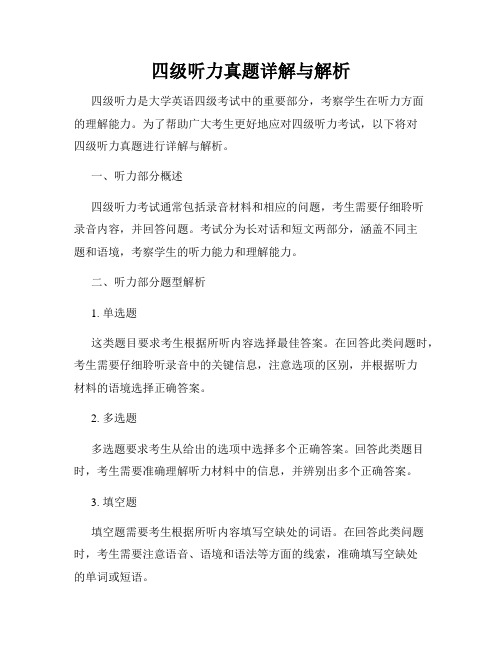
四级听力真题详解与解析四级听力是大学英语四级考试中的重要部分,考察学生在听力方面的理解能力。
为了帮助广大考生更好地应对四级听力考试,以下将对四级听力真题进行详解与解析。
一、听力部分概述四级听力考试通常包括录音材料和相应的问题,考生需要仔细聆听录音内容,并回答问题。
考试分为长对话和短文两部分,涵盖不同主题和语境,考察学生的听力能力和理解能力。
二、听力部分题型解析1. 单选题这类题目要求考生根据所听内容选择最佳答案。
在回答此类问题时,考生需要仔细聆听录音中的关键信息,注意选项的区别,并根据听力材料的语境选择正确答案。
2. 多选题多选题要求考生从给出的选项中选择多个正确答案。
回答此类题目时,考生需要准确理解听力材料中的信息,并辨别出多个正确答案。
3. 填空题填空题需要考生根据所听内容填写空缺处的词语。
在回答此类问题时,考生需要注意语音、语境和语法等方面的线索,准确填写空缺处的单词或短语。
判断题要求考生根据所听内容判断陈述是否正确。
在回答此类问题时,考生需要仔细聆听录音材料中的信息,并根据听到的内容判断陈述是否与录音一致。
三、四级听力备考技巧1. 提前熟悉题型针对不同的题型,考生需要提前了解并掌握解题技巧,熟悉常见的听力考点和出题方式,这样在真正进行考试时能更好地应对。
2. 注重练习通过大量的听力训练,提高自己的听力水平,增强对英语语音和语境的理解能力。
可以选择听力材料进行听力训练,逐渐提高听力速度和听力准确度。
3. 注意记笔记在听力过程中,可以适当记下一些关键信息,如人名、地点、时间等,以帮助理解和回答问题。
但要注意不要过度依赖笔记,影响对听力内容的理解。
4. 注意听力重点针对录音材料,要注意抓住关键词、关键信息,提高听力的效果。
在回答问题时,可以根据关键词快速定位信息所在,更好地理解和回答问题。
四级听力考察的是综合能力,包括听力、理解、记忆等多方面的素质。
除了提高听力能力外,还要注重拓宽阅读、积累词汇、加强口语练习等,提高整体的英语能力水平。
四级听力真题剖析与详解指导
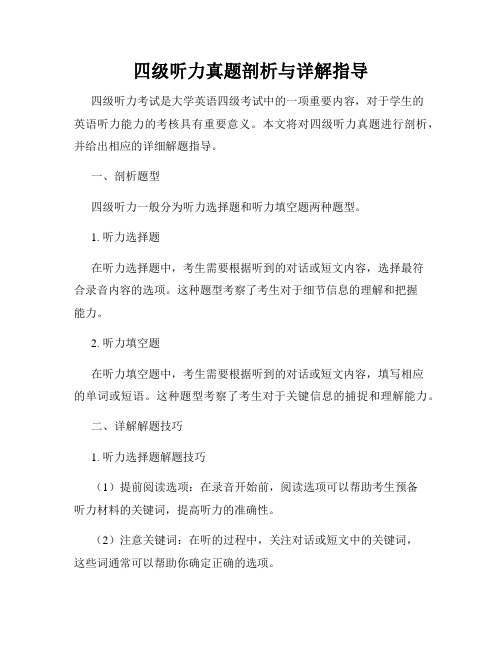
四级听力真题剖析与详解指导四级听力考试是大学英语四级考试中的一项重要内容,对于学生的英语听力能力的考核具有重要意义。
本文将对四级听力真题进行剖析,并给出相应的详细解题指导。
一、剖析题型四级听力一般分为听力选择题和听力填空题两种题型。
1. 听力选择题在听力选择题中,考生需要根据听到的对话或短文内容,选择最符合录音内容的选项。
这种题型考察了考生对于细节信息的理解和把握能力。
2. 听力填空题在听力填空题中,考生需要根据听到的对话或短文内容,填写相应的单词或短语。
这种题型考察了考生对于关键信息的捕捉和理解能力。
二、详解解题技巧1. 听力选择题解题技巧(1)提前阅读选项:在录音开始前,阅读选项可以帮助考生预备听力材料的关键词,提高听力的准确性。
(2)注意关键词:在听的过程中,关注对话或短文中的关键词,这些词通常可以帮助你确定正确的选项。
(3)排除干扰选项:一般来说,选项中会出现与录音材料相关但不准确的信息,要学会排除这些干扰选项。
(4)仔细审题:对于某些带有否定含义的选择题,要特别注意否定词的作用,避免产生选择错误。
2. 听力填空题解题技巧(1)提前预测:在录音开始前,尝试预测所需要填写的单词或短语,这样可以更好地集中注意力去捕捉关键信息。
(2)抓主题词:聚焦关键词,特别是与空白所在句子有关的主题词,将其准确地填入空白处。
(3)顺序原则:在填写过程中,保持与录音材料相同的顺序,避免填错空白。
(4)选项变换:有时,录音中的单词会在填写时进行变换,例如变为复数形式或者进行动词时态的转换,要善于发现这些差异并将其正确地填写。
三、总结与建议在备考阶段,要多听英语材料,提高自己的英语听力水平。
同样重要的是,切实掌握听力解题技巧,例如提前预测、关注关键词、排除干扰选项等。
此外,考生还应注重积累词汇和语法知识,这对于正确理解和选择选项非常重要。
以上是对四级听力真题的剖析与详解指导。
希望考生能够在备考时灵活运用这些技巧,取得优异的成绩。
四级听力题目讲解

四级听力题目讲解-CAL-FENGHAI-(2020YEAR-YICAI)_JINGBIANSection A news report 1-7 71.A)In a jewelry shop. B)In the City Mall. C)Near a lorry. D)In a parking lot.2.A)They left the lorry together.B)They left the lorry without hoods.C)They run back to the lorry separately.D)They run back to the lorry without hoods.3.A)The heart of London was flooded.B)An emergency exercise was conducted.C)100 people in the suburbs were drowned.D)One of the bridges between north and south London collapsed.4.A)A flood wall was built.B)Rescue teams were formed.C)An alarm system was set up.D)50 underground stations were made waterproof.5.A)Through the School of Design and Visual Arts.B)Through the School of Social Work.C)Through the School of Business.D)Through the Arts and Science program.6.A)About 20,000 dollars. B)About 27,000 dollars.C)About 38,000 dollars. D)About 50,000 dollars.7.A)Federal loans. B)Private loans.C)Scholarships. D)A monthly payment plan. Section B conversation 8-15 88.A)Colleagues. B)Instructor and student.C)Neighbors. D)Anchor and guest.9.A)Baby-sitting the children.B)Documenting the children.C)Complaining about the difficulty of living.D)Teaching teenagers.10.A)Sensitive groups. B)Disadvantaged groups.C)Rich groups. D)Complicated groups.11.A)Kids are facing big issues in life.B)Life is moving fast recently.C)Kids can not earn the living.D)Kids are growing up quickly.12.A)He has a lot of free time.B) Many of his friends are actors.C)She knows he likes acting.D)He’s looking for an acting job.13.A)One night a week.B)Every Wednesday for three hours.C)Every other Thursday.D)Three times a week.14.A)He has to rearrange his evening schedule.B)His schoolwork takes up most of his time.C)He hasn’t been in a play for a long time.D)He might not like the way the group works.15.A)See her on Wednesday. B)Learn his part quickly.C)Enjoy the rehearsal. D)Pick her up on Thursday.Section C passage 16-25 1016.A)Summer vacation. B)The housing office.C)Resident advisers. D)Check-out procedures.17.A)Register for summer school.B)Repair holes in room walls.C)Remove personal property.D)Call the housing office.18.A)Their summer addresses.B)Any damage to their rooms.C)When the plan to leave.D)Questions for the housing office.19.A)Your heart rate is lowered.B)It becomes harder for you to relax.C)You become too tired to sleep.D)Your sleeping rhythms are disrupted.20.A)Failure to rest during the day.B)Lack of sleep on weekends.C)Vigorous exercise in the evening.D)Eating cheese before going to bed.21. A)They might eventually cause you to lose sleep.B)They help produce a neurotransmitter in the brain.C)You must not drink milk if you take them.D)They make it unnecessary to take naps.21.A)Characteristics of sand.B)How animals live in the desert.C)A snake’s special way of moving.D)Techniques of skiing.23.A)To climb hills. B)To gain traction.C)To fool its enemies. D)To rest as it moves.24.A)Wavy lines. B)Circular lines.C)Perpendicular lines. D)Parallel lines.25.A)Lower body temperatures.B)Decreased energy consumption.C)Greater ability to conceal itself.D)Wider range of vision.。
英语四级听力题目类型分析
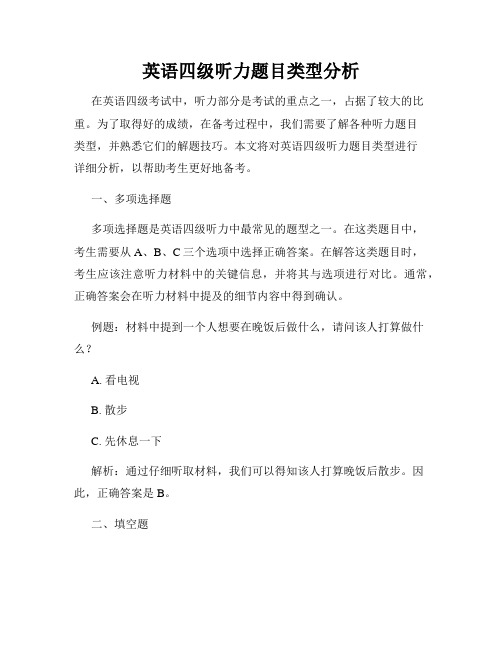
英语四级听力题目类型分析在英语四级考试中,听力部分是考试的重点之一,占据了较大的比重。
为了取得好的成绩,在备考过程中,我们需要了解各种听力题目类型,并熟悉它们的解题技巧。
本文将对英语四级听力题目类型进行详细分析,以帮助考生更好地备考。
一、多项选择题多项选择题是英语四级听力中最常见的题型之一。
在这类题目中,考生需要从A、B、C三个选项中选择正确答案。
在解答这类题目时,考生应该注意听力材料中的关键信息,并将其与选项进行对比。
通常,正确答案会在听力材料中提及的细节内容中得到确认。
例题:材料中提到一个人想要在晚饭后做什么,请问该人打算做什么?A. 看电视B. 散步C. 先休息一下解析:通过仔细听取材料,我们可以得知该人打算晚饭后散步。
因此,正确答案是B。
二、填空题填空题是英语四级听力中另一个常见的题型。
在这类题目中,考生需要根据听到的内容,填写合适的单词或短语。
解答这类题目时,关键是提高听力理解能力和对词汇的掌握。
例题:听到一则通知:会议将在_____举行。
解析:听取通知后,我们需要根据上下文来判断答案。
在这个例子中,答案可能是一个具体的日期或时间,我们需要仔细听取通知的其他内容来确定答案。
三、配对题配对题要求考生根据对话的内容和目的,将其中的人物或事件与提供的选项进行匹配。
在解答这类题目时,考生需要仔细听取对话的关键信息,并通过归纳总结的方式,将其与选项进行匹配。
例题:听到一个对话: A. 你喜欢电影吗?B. 是的,我很喜欢。
A. 那你最喜欢哪类电影?请问B最喜欢的电影类型是?A. 爱情片B. 动作片C. 恐怖片解析:通过仔细听取对话,我们可以得知B最喜欢的电影类型是动作片。
因此,正确答案是B。
四、笔记题笔记题是英语四级听力中较为复杂的题型之一。
在这类题目中,听力材料通常会播放一段学术演讲或讨论,而考生需要根据听力材料获得的关键信息,完成一份笔记。
解答这类题目时,考生需要提高听力速度和抓住重点信息的能力。
英语专业四级听力答案解析
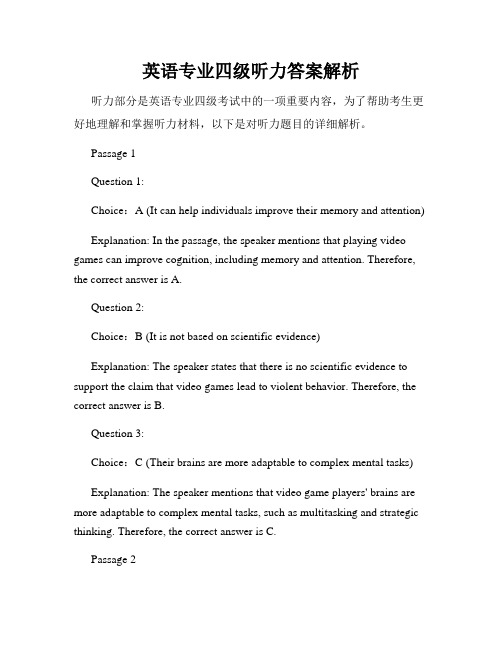
英语专业四级听力答案解析听力部分是英语专业四级考试中的一项重要内容,为了帮助考生更好地理解和掌握听力材料,以下是对听力题目的详细解析。
Passage 1Question 1:Choice:A (It can help individuals improve their memory and attention)Explanation: In the passage, the speaker mentions that playing video games can improve cognition, including memory and attention. Therefore, the correct answer is A.Question 2:Choice:B (It is not based on scientific evidence)Explanation: The speaker states that there is no scientific evidence to support the claim that video games lead to violent behavior. Therefore, the correct answer is B.Question 3:Choice:C (Their brains are more adaptable to complex mental tasks)Explanation: The speaker mentions that video game players' brains are more adaptable to complex mental tasks, such as multitasking and strategic thinking. Therefore, the correct answer is C.Passage 2Question 4:Choice:B (To promote sustainable farming practices)Explanation: The speaker introduces a program that aims to promote sustainable farming practices, such as reducing chemical use and protecting biodiversity. Therefore, the correct answer is B.Question 5:Choice:C (To overcome challenges and gain success in organic farming)Explanation: The speaker discusses the challenges faced by organic farmers, such as lack of government support and limited market access. However, successful organic farmers are mentioned, indicating that overcoming these challenges can lead to success. Therefore, the correct answer is C.Question 6:Choice:A (The students' hands-on experience in organic farming)Explanation: The speaker mentions that students in the program gain hands-on experience in organic farming, which allows them to apply their knowledge and skills. Therefore, the correct answer is A.Passage 3Question 7:Choice:B (They were based on assumptions rather than evidence)Explanation: The speaker mentions that early theories about the migration of Pacific Islanders were based on assumptions rather than concrete evidence. Therefore, the correct answer is B.Question 8:Choice:C (The Polynesians' impressive navigation skills)Explanation: The speaker discusses the impressive navigational skills of the Polynesians, which enabled them to navigate the vast Pacific Ocean and settle in remote islands. Therefore, the correct answer is C.Question 9:Choice:A (Mapping patterns of wind and ocean currents)Explanation: The speaker suggests that the Polynesians were able to navigate using their knowledge of mapping patterns of wind and ocean currents. Therefore, the correct answer is A.总结:以上是对英语专业四级听力部分的详细解析。
2023年6月英语四级听力第三套
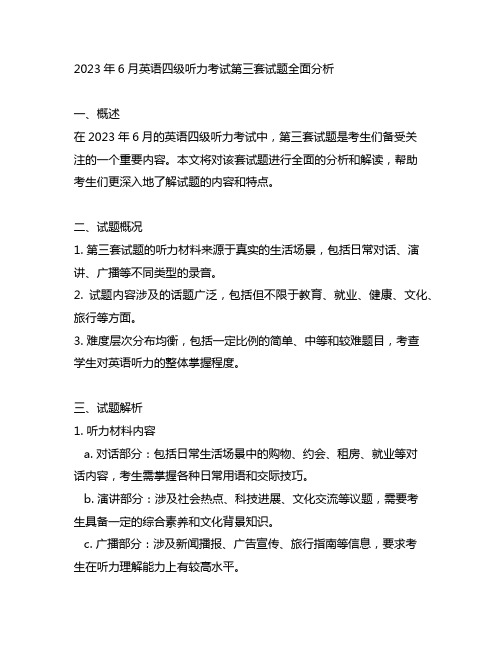
2023年6月英语四级听力考试第三套试题全面分析一、概述在2023年6月的英语四级听力考试中,第三套试题是考生们备受关注的一个重要内容。
本文将对该套试题进行全面的分析和解读,帮助考生们更深入地了解试题的内容和特点。
二、试题概况1. 第三套试题的听力材料来源于真实的生活场景,包括日常对话、演讲、广播等不同类型的录音。
2. 试题内容涉及的话题广泛,包括但不限于教育、就业、健康、文化、旅行等方面。
3. 难度层次分布均衡,包括一定比例的简单、中等和较难题目,考查学生对英语听力的整体掌握程度。
三、试题解析1. 听力材料内容a. 对话部分:包括日常生活场景中的购物、约会、租房、就业等对话内容,考生需掌握各种日常用语和交际技巧。
b. 演讲部分:涉及社会热点、科技进展、文化交流等议题,需要考生具备一定的综合素养和文化背景知识。
c. 广播部分:涉及新闻播报、广告宣传、旅行指南等信息,要求考生在听力理解能力上有较高水平。
2. 出现频率较高的考查点a. 数字、时间、日期等具体信息的获取和理解。
b. 主旨大意的把握与概括。
c. 各类修辞手法的应用和理解。
d. 各种语气和情感色彩的表达和分辨。
3. 解题技巧a. 注意细节:在听力过程中,要特别注重对细节信息的抓取和准确理解,这些信息往往是选择题和填空题的依据。
b. 整体把握:不仅要理解每一个句子或者每一个片段的内容,还要注重抓住整体语境和主题大意。
c. 积累常用表达:平时积累一些常用的英语表达和习惯用语,对于听力理解和回答问题有一定帮助。
四、备考建议1. 提前了解试题形式和特点,制定针对性的复习计划,合理安排时间,适当调整心态。
2. 多听多练:平时多听一些英语广播、新闻、电视剧等,提高自己的听力水平和语感。
3. 听力技巧训练:可以寻找一些专门针对英语听力的训练资料,进行针对性的听力练习。
4. 查漏补缺:不断总结巩固知识点,同时查漏补缺,及时纠正错误。
五、结语2023年6月英语四级听力考试第三套试题的分析,希望能够帮助考生更好地备考和应对考试,希望每一位考生都能取得理想的成绩,加油!六、应对解题技巧强化1. 重视细节把握:在听力过程中,考生要能够快速而准确地抓住细节信息。
四级听力题目类型介绍

英语四级听力题目的类型包括:
1. 短对话:通常涉及两个人之间的对话,涵盖了日常生活、工作、学习等多个领域。
对话内容较为简单,一般围绕一个话题进行,问题也往往与对话内容密切相关。
2. 长对话:由两个或多个参与者展开的对话,对话内容较长,往往涉及多个话题和信息。
问题也比较复杂,不仅需要考生理解对话的内容,还需要考生分析对话中的细节和隐含意义。
3. 短文理解:一篇短文,长度约为 200 词左右,主要是介绍一些事实、故事、观点等。
问题通常需要考生理解文章的主要内容、细节和主题,并做出选择或判断。
4. 短文听写:要求考生在听完一篇短文后,写下文章的主要内容,包括文章中的细节、句子和单词。
这是四级听力中难度最高的一种题型,需要考生具备较高的听力理解和拼写能力。
5. 复合式听写:在复合式听写中,考生需要在听完一篇短文后,写下文章的主要内容,包括文章中的细节、句子和单词。
同时,考生还需要听懂一段话,然后根据所听到的内容回答问题。
这种题型不仅需要考生具备较高的听力理解和拼写能力,还需要考生具备较强的问题分析和解答能力。
以上是英语四级听力题目的主要类型,每种类型都有其独特的难度和特点,需要考生在平时的学习和练习中逐步提高自己的听力水平和答题能力。
大学英语四级考试听力理解题解析及应试技巧

大学英语四级考试听力理解题解析及应试技巧听力理解题是大学英语四级考试常考的一种题型。
本文简要分析了大学英语四级考试听力部分的常考题型,并提出了具体有效的应试技巧,旨在让考生了解题型并灵活地将这些技巧应用于实践中。
一、对话部分1.语义推断题。
这一题型的形式一般是:“What can we learn/infer/conclude from the man’s reply?”“What does the man/woman mean?”等。
主要考查考生对谈话双方或一方所讲内容的理解,说话人往往不是直接说明所要表达的意思,考生要结合上下文进行理解才能得出正确答案。
2.行为打算题。
问题形式一般为:“What’s he possibly going to do?”“What does the woman plan to do?”等。
这类题的选项往往是具有相同主语、不同动词或宾语的句子,或是现在分词、不定式,其中不定式居多,而能够用不定式回答的问题一般是“将要做什么”、“应该做什么”。
解答这类题的关键在于快速浏览选项、预测问题。
3.请求建议题。
问题形式一般为:“What’s the man’s suggestion?”“What did the woman advise the man to do?”等。
此类题的关键是要注意第二个说话者的态度和反应往往是解题的关键。
说话者会拒绝、有条件地接受请求或建议。
因此对表示请求及建议的常用句型如“How/what about...?”“Will you...?”“Why not...?”等都应该熟悉。
4.场景推断题。
问题形式一般为:“Where did the conversation most probably take place?”“What is the probable relationship between the two speakers?”等。
此类题中,有些地点是对话中直接提到的,有些需要根据对话内容进行推断。
2024年7月英语四级真题及参考答案完整版
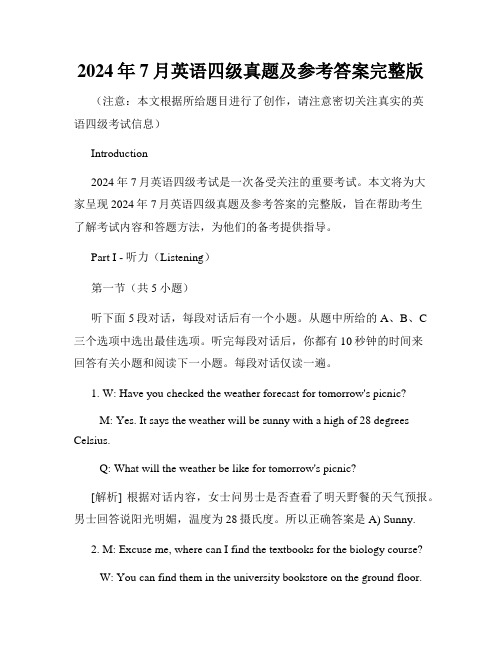
2024年7月英语四级真题及参考答案完整版(注意:本文根据所给题目进行了创作,请注意密切关注真实的英语四级考试信息)Introduction2024年7月英语四级考试是一次备受关注的重要考试。
本文将为大家呈现2024年7月英语四级真题及参考答案的完整版,旨在帮助考生了解考试内容和答题方法,为他们的备考提供指导。
Part I - 听力(Listening)第一节(共5小题)听下面5段对话,每段对话后有一个小题。
从题中所给的A、B、C 三个选项中选出最佳选项。
听完每段对话后,你都有10秒钟的时间来回答有关小题和阅读下一小题。
每段对话仅读一遍。
1. W: Have you checked the weather forecast for tomorrow's picnic?M: Yes. It says the weather will be sunny with a high of 28 degrees Celsius.Q: What will the weather be like for tomorrow's picnic?[解析] 根据对话内容,女士问男士是否查看了明天野餐的天气预报。
男士回答说阳光明媚,温度为28摄氏度。
所以正确答案是 A) Sunny.2. M: Excuse me, where can I find the textbooks for the biology course?W: You can find them in the university bookstore on the ground floor.Q: Where does the conversation most probably take place?[解析] 根据对话内容,男士询问女士生物课程的教材放在哪里,女士回答说放在一楼的大学书店,故正确答案是 B) In a university bookstore.3. W: The new mall is opening tomorrow. Would you like to go shopping there with me?M: I'd love to, but I have a meeting in the afternoon. How about this weekend?Q: What does the man mean?[解析] 女士邀请男士一起去新开的购物中心逛街,男士表示很想去但是有一个下午的会议,问女士这周末如何。
【2024版】大学英语四级听力考试套题练习及原文解析
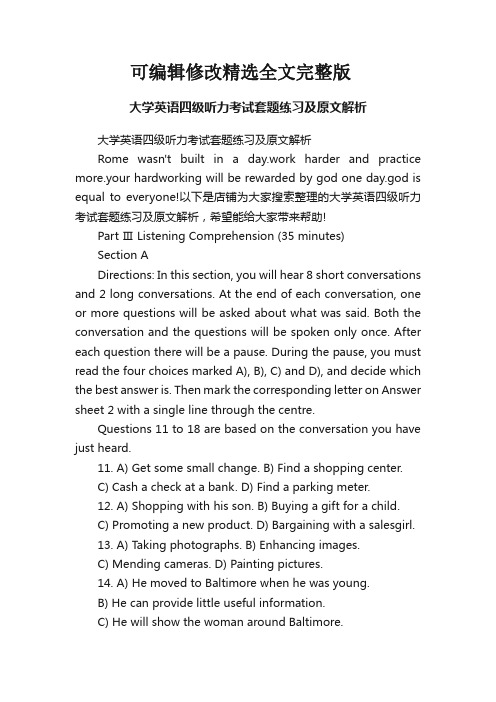
可编辑修改精选全文完整版大学英语四级听力考试套题练习及原文解析大学英语四级听力考试套题练习及原文解析Rome wasn't built in a day.work harder and practice more.your hardworking will be rewarded by god one day.god is equal to everyone!以下是店铺为大家搜索整理的大学英语四级听力考试套题练习及原文解析,希望能给大家带来帮助!Part Ⅲ Listening Comprehension (35 minutes)Section ADirections: In this section, you will hear 8 short conversations and 2 long conversations. At the end of each conversation, one or more questions will be asked about what was said. Both the conversation and the questions will be spoken only once. After each question there will be a pause. During the pause, you must read the four choices marked A), B), C) and D), and decide which the best answer is. Then mark the corresponding letter on Answer sheet 2 with a single line through the centre.Questions 11 to 18 are based on the conversation you have just heard.11. A) Get some small change. B) Find a shopping center.C) Cash a check at a bank. D) Find a parking meter.12. A) Shopping with his son. B) Buying a gift for a child.C) Promoting a new product. D) Bargaining with a salesgirl.13. A) Taking photographs. B) Enhancing images.C) Mending cameras. D) Painting pictures.14. A) He moved to Baltimore when he was young.B) He can provide little useful information.C) He will show the woman around Baltimore.D) He will ask someone else to help the woman.15. A) He is rather disappointed. B) He is highly ambitious.C) He can’t face up to the situation D) He knows his own limitation.16. A) She must have paid a lot B) She is known to havea terrific figure.C) Her gym exercise has yielded good results.D) Her effort to keep fit is really praiseworthy.17. A) Female students are unfit for studying physics.B) He can serve as the woman’s tutor.C) Physics is an important course at school.D) The professor’s suggestion is constructive.18. A) Indifferent. B) Doubtful. C) Pleased. D) Surprised.Questions 19 to 22 are based on the conversation you have just heard.19. A) He prefers the smaller evening classes. B) He has signed up for a day course.C) He has to work during the day. D) He finds the evening course cheaper.20. A) Learn a computer language. B) Learn data processing.C) Buy some computer software. D) Buy a few coursebooks.21. A) Thursday evening, from 7:00 to 9:45. B) From September 1 to New Year’s eve.C) Every Monday, lasting for 12 weeks. D) Three hours a week,45 hours in total.22. A) What to bring for registration. B) Where to attend the class.C) How he can get to Frost Hall. D) Whether he can use a check.Questions 23 to 25 are based on the conversation you havejust heard.23. A) A training coach. B) A trading adviser.C) A professional manager. D) A financial trader.24. A) He can save on living expenses. B) He considers cooking creative.C) He can enjoy healthier food. D) He thinks take-away is tasteless.25. A) It is something inevitable.B) It is frustrating sometimes.C) It takes patience to manage. D) It can be a good thing.Section BDirections: In this section, you will hear 3 short passages. At the end of each passage, you will hear some questions. Both the passage and the questions will be spoken only once. After you hear a question, you must choose the best answer from the four choices marked A), B), C) and D). Then mark the corresponding letter on Answer Sheet 2 with a single line through the centre.Passage OneQuestions 26 to 28 are based on the passage you have just heard.26. A) There were no planets without moons. B) There was no air or water on Jupiter.C) Life was not possible in outer space. D) The mystery of life could not be resolved.27. A) It has a number of active volcanoes. B) It has an atmosphere like the earth’s.C) It has a large ocean under its surface. D) It has deep caves several miles long.28. A) Light is not an essential element to it. B) Life can form in very hot temperatures.C) Every form of life undergoes evolution. D) Oxygen is not needed for some life forms.Passage TwoQuestions 29 to 31 are based on the passage you have just heard.29. A) Whether they should take the child home.B) What Dr. Mayer’s instructions exactly were.C) Who should take care of the child at home.D) When the child would completely recover.30. A) She encourages them to ask questions when in doubt.B) She makes them write down all her instructions.C) She has them act out what they are to do at home.D) She asks them to repeat what they are supposed to do.31. A) It lacks the stability of the printed word. B) It contains many grammatical errors.C) It is heavily dependent on the context. D) It facilitates interpePassage ThreeQuestions 33 to 35 are based on the passage you have just heard.32. A) Job security. B) Good labour relations.C) Challenging work. D) Attractive wages and benefits.33. A) Many tedious jobs continue to be done manually.B) More and more unskilled workers will lose jobs.C) Computers will change the nature of many jobs.D) Boring jobs will gradually be made enjoyable.34. A) Offer them chances of promotion.B) Improve their working conditions.C) Encourage them to compete with each other.D) Give them responsibilities as part of a team.35. A) They will not bring real benefits to the staff.B) They concern a small number of people only.C) They are arbitrarily set by the administrators.D) They are beyond the control of ordinary workers.Section CDirections: In this section, you will hear a passage three times. When the passage is read for the first time, you should listen carefully for its general idea. When the passage is read for the second time, you are required to fill in the blanks numbered from 36 to 43 with the exact words you have just heard. For blanks numbered from 44 to 46 you are required to fill in the missing information. For these blanks, you can either use the exact words you have just heard or write down the main points in your own words. Finally, when the passage is read for the third time, you should check what you have written.注意:此部分试题在答题卡2上。
2023年12月四级真题听力和答案解析资料
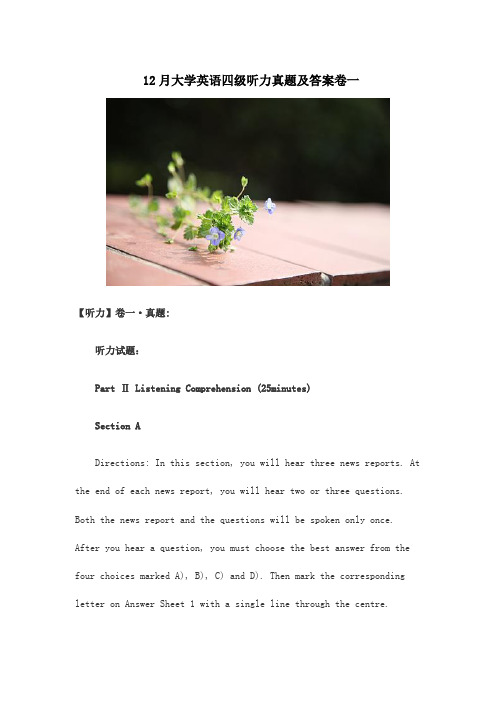
12月大学英语四级听力真题及答案卷一【听力】卷一·真题:听力试题:Part Ⅱ Listening Comprehension (25minutes)Section ADirections: In this section, you will hear three news reports. At the end of each news report, you will hear two or three questions. Both the news report and the questions will be spoken only once.After you hear a question, you must choose the best answer from the four choices marked A), B), C) and D). Then mark the corresponding letter on Answer Sheet 1 with a single line through the centre.Questions 1 to 2 are based on the conversation you have just heard.1. A) It was dangerous to live in. C) He could no longer pay the rent.B) It was going to be renovated. D) He had sold it to the royal family.2. A) A strike. C) A forest fire.B) A storm. D) A terrorist attack.Questions 3 to 4 are based on the conversation you have just heard.3. A) They lost contact with the emergency department.B) They were trapped in an underground elevator.C) They were injured by suddenly falling rocks.D) They sent calls for help via a portable radio.4. A) They tried hard to repair the elevator.B) They released the details of the accident.C) They sent supplies to keep the miners warm.D) They provided the miners with food and water.Questions 5 to 7 are based on the conversation you have just heard.5. A) Raise postage rates.B) Improve its services.C) Redesign delivery routes.D) Close some of its post offices.6. A) Shortening business hours.B) Closing offices on holidays.C) Stopping mail delivery on Saturdays.D) Computerizing mail sorting processes.7. A) Many post office staff will lose their jobs.B) Many people will begin to complain.C) Taxpayers will be very pleased.D) A lot of controversy will arise.听力原文短篇新闻2Section A - 2Rescue efforts were underway Thursday morning for 17 miners who were stuck in an elevator below ground at a Cargill rock salt mine near Lansing, New York, according to Marcia Lynch.Public information officer with Tompkins County’s emergency response department, emergency workers have made contact with the miners via a radio. And they all appear to be uninjured, said Jessica Verfuss, the emergency department’s assistant director.Crews have managed to provide heat packs and blankets to the miners so that they can keep warm during the rescue operation, Verfuss said. Details about what led to the workers’ being trapped in the elevator went immediately available. The mine, along New York’s Cayuga Lake, processes salt used for road treatment. It produces about 2 million tons of salt that is shipped to more than 1,500 places in the northeastern United States, the rock salt mine is one of three operated by Cargill with the other two in Louisiana and Ohio.Q3. What does the news report say about the salt miners?Q4.What did the rescue team do?短篇新闻3Section A - 3The U.S. Postal Service announced today that it is considering closing about 3,700 post offices over the next year because offalling revenues.Facing an $8.3 billion budget deficit this year, closing post officers is one of several proposals the Postal Service has put forth recently to cut costs. Last week, for example, Postmaster General Pat Donahoe announced plans to stop mail delivery on Saturdays, a move he says could save $3 billion annually.“We are losing revenue as we speak,” Donahoe said. “We do not want taxpayer money. We want to be self-sufficient. So like any other business you have to make choices.”Dean Granholm the vice president for delivery and post office operations said the first waves of closings would begin this fall. He estimated that about 3,000 postmasters, 500 station managers and between 500 and 1,000 postal clerks could lose their jobs.Q5.What is the U.S. Postal Service planning to do?Q6.What measure has been planned to save costs?Q7.What will happen when the proposed measure come into effect? Section BDirections: In this section, you will hear two long conversations. At the end of each conversation you will hear four questions. Boththe conversations and the question-s will be spoken only once. After you hear a question, you must choose the best answer from the four choices marked A), B), C) and D). Then mark the corresponding letter on Answer Sheet 1 with a single line through the centre.Questions 8 to 11 are based on the conversation you have just heard.8. A) He will be kept from promotion.B) He will go through retraining.C) He will be given a warning.D) He will lose part of his pay.9. A) He is always on time.B) He is a trustworthy guy.C) He is an experienced press operator.D) He is on good terms with his workmates.10. A) She is a trade union representative.B) She is in charge of public relations.C) She is a senior manager of the shop.D) She is better at handling such matters.11. A) He is skilled and experienced.B) He is very close to the manager.C) He is always trying to stir up trouble.D) He is always complaining about low wages.Questions 12 to 15 are based on the conversation you have just heard.12. A) Open.B) Selfish.C) Friendly.D) Reserved.13. A) They stay quiet.B) They read a book.C) They talk about the weather.D) They chat with fellow passengers.14. A) She was always treated as a foreigner.B) She was eager to visit an English castle.C) She was never invited to a colleague’s home.D) She was unwilling to make friends with workmates.15. A) Houses are much more quiet.B) Houses provide more privacy.C) They want to have more space.D) They want a garden of their own.听力原文:长对话1&2Conversation 1A: Mrs. Hampton, we've got trouble in the press room this morning.B: Oh dear. What about?A: One of the press operators arrived an hour and a half late.B: But that's a straightforward affair. He will simply lose partof his pay. That's why we have a clock-in system.A: But the point is the man was clocked-in at 8 o'clock. We have John standing by the time clock, and he swears he saw nothing irregular.B: Is John reliable?A: Yes, he is. That's why we chose him for the job.B: Have you spoken to the man who was late?A: Not yet. I thought I'd have a word with you first. He's a difficult man, and I think there's been some trouble on the shop floor. I've got a feeling that trade union representative is behind this. The manager told me that Jack Green's been very active around the shop the last few days.B: Well, what do you want me to do?A: I was wondering if you'd see Smith, the man who was late, because you are so much better at handling things like this.B: Oh, alright. I'll see him. I must say I agree with you about there being bad feelings in the works. I've had the idea for sometime that Jack Green's been busy stirring things up in connectionwith the latest wage claim. He's always trying to make trouble. Well, I'll get the manager to send Smith up here.Q8. What will happen to the press operator who was late for the work according to the woman?Q9. What does the man say about John who stands by the time clock?Q10. Why does the man suggest the woman see the worker who was late?Q11. What does the woman say about Jack Green?Conversation 2A: Our topic today is about somethings that foreigners nearly always say when they visit Britain. It's 'Why are the British so cold?' And they're talking about the British personality – thefamous British 'reserve'. It means that we aren't very friendly, we aren't very open.B: So do you think it's true?A: It's a difficult one. So many people who visit Britain sayit's difficult to make friends with British people. They say we're cold, reserved, unfriendly...B: I think it's true. Look at Americans or Australians. They speak the same language, but they're much more open. And you see it when you travel, people - I mean strangers - speak to you on the street or on the train. British people seldom speak on the train. Or the bus. Not in London, anyway.A: 'Not in London'. That's it. Capital cities are full of tourists and are never very friendly. People are different in other parts of the country.B: Not completely. I met a woman once, an Italian. She's been working in Manchester for two years,and no one - not one of her colleagues - had ever invited her to their home. They were friendly to her at work, but nothing else. She couldn't believe it. She said that would never happen in Italy.A: You know what they say – 'an Englishman's home is his castle'. It’s really difficult to get inside.B: Yeah. It's about being private. You go home to your house and your garden and you close the door. It's your place.A: That's why the British don't like flats. They prefer to livein houses.B: That’s true.Q12. What do foreigners generally think of British people according to the woman?Q13. What may British people typically do one the train according to the man?Q14. What does the man say about the Italian woman working in Manchester?Q15. Why do British people prefer houses to flats?Section CDirections: In this section, you will hear three passages. At the end of each passage, you will hear three or four questions. Both the passage and the questions will be spoken only once. After you hear a question, you must choose the best answer from the four choices marked A), B), C) and D).Then mark the corresponding letter on Answer Sheet 1 with a single line through the centre.Questions 16 to 18 are based on the conversation you have just heard.16. A) They don’t have much choice of jobs.B) They are likely to get much higher pay.C) They don’t have to go through job interviews.D) They will automatically be given hiring priority.17. A) Ask their professors for help.B) Look at school bulletin boards.C) Visit the school careers service.D) Go through campus newspapers.18. A) Helping students find the books and journals they need.B) Supervising study spaces to ensure a quiet atmosphere.C) Helping students arrange appointments with librarians.D) Providing students with information about the library.Questions 19 to 21 are based on the conversation you have just heard.19. A) It tastes better.B) It is easier to grow.C) It may be sold at a higher price.D) It can better survive extreme weathers.20. A) It is healthier than green tea.B) It can grow in drier soil.C) It will replace green tea one day.D) It is immune to various diseases.21. A) It has been well received by many tea drinkers.B) It does not bring the promised health benefits.C) It has made tea farmers’ life easier.D) It does not have a stable market.Questions 22 to 25 are based on the conversation you have just heard.22. A) They need decorations to show their status.B) They prefer unique objects of high quality.C) They decorate their homes themselves.D) They care more about environment.23. A) They were proud of their creations.B) They could only try to create at night.C) They made great contributions to society.D) They focused on the quality of their products.24. A) Make wise choices.B) Identify fake crafts.C) Design handicrafts themselves.D) Learn the importance of creation.25. A) To boost the local economy.B) To attract foreign investments.C) To arouse public interest in crafts.D) To preserve the traditional culture.听力原文听力篇章:Passage OneIn college, time is scarce, and consequently, very precious. At the same time, expenses in college pile up surprisingly quickly. A part time job is a good way to balance costs while ensuring there is enough time left over for both academic subjects and after-class activities.If you are a college student looking for a part time job, the best place to start your job search is right on campus. There are tons of on-campus job opportunities, and as a student, you’ll automatically be given hiring priority. Plus, on-campus jobs eliminate commuting time, and could be a great way to connect with academic and professional resources at your university. Check withyour school’s career service or employment office for help to find a campus job. Of course, there are opportunities for part-time workoff-campus, too. If you spend a little time digging for the right part time jobs, you’ll save yourself time when you find a job that leaves you with enough time to get your school work done, too. If you are a college student looking for work but worry you won’t have enough time to devote to academic subjects, consider working as a study hall or a library monitor. Responsibilities generally include supervising study spaces to ensure that a quiet atmosphere is maintained. It’s a pretty easy job, but one with lots of downtime-which means you will have plenty of time to catch up on reading, do homework or study for an exam.Q16: What does the speaker say about college students applyingfor on-campus jobs?Q17: What can students do to find a campus job according to the speaker?Q18: What does the speaker say is a library monitor’s responsibility?Passage TwoAgricultural workers in green tea fields near Mt. Kenya are gathering the tea leaves. It is beautiful to see. The rows of tea bushes are straight. All appears to be well. But the farmers who planted the bushes are worried. Nelson Kibara is one of them. He has been growing tea in the Kerugoya area for 40 years.He says the prices this year have been so low that he has made almost no profit. He says he must grow different kinds of tea if he is to survive.Mr. Kibara and hundreds of other farmers have been removing some of their tea bushes and planting a new kind of tea developed by the Tea Research Foundation of Kenya. Its leaves are purple and brown. When the tea is boiled, the drink has a purple color. Medical researchers have studied the health benefits of the new tea. They say it is healthier than green tea and could be sold for a price that is three to four times higher than the price of green tea.But Mr. Kibara says he has not received a higher price for his purple tea crop.He says the market for the tea is unstable and he is often forced to sell his purple tea for the same price as green tea leaves. Hesays there are not enough buyers willing to pay more for the purple tea.Q19. Why have tea farmers in Kenya decided to grow purple tea?Q20. What do researchers say about purple tea?Q21. What does Mr. Kibara find about purple tea?Passage ThreeToday's consumers want beautiful handcrafted s to wear and tohave for their home environment. They prefer something unique andthey demand quality. Craftsmen today are meeting this demand. People and homes are showing great change as more and more uniquehandcrafted items become available. Handcrafts are big business. No long does a good craftsman have to work in a job he dislikes all day and then try to create at night. He has earned his professional status. He is now a respected member of society. Parts of the fun of being a craftsman is meeting other craftsmen. They love to sharetheir ideas and materials and help others find markets for their work. Craftsmen have helped educate consumers to make wise choices. They help them become aware of design and technique. They help them relate their choice to its intended use. They often involve consumers intrying the craft themselves. When a group of craftsmen expends to include more members, a small craft organization is formed. Such an organization does a lot in training workshops in special media, craft marketing techniques, craft fairs and sales, festivals, TV appearances and demonstrations. State art councils help sponsor local arts and crafts festivals which draw crowds of tourist consumers.This boosts the local economy considerably because tourists not only buy crafts, but they also use the restaurants and hotels and other services of the area.Q22. What does the speaker say about today's consumers?Q23. What does the speaker say about a good craftsman in the past?Q24. What do craftsmen help consumers do?Q25. Why do state art councilshelp sponsor local arts and crafts festivals?听力参照答案:Section A1. [A] It was dangerous to live in.2. [B] A storm3. [B] They were trapped in an underground elevator.4. [C] They sent supplies to keep the miners warm.5. [D] Close some of its post office.6. [C] Stopping mail delivery on Saturdays.7. [A] Many post office staff will lose their jobs. Section B8. [D] He will lose part of his pay.9. [B] He is a trustworthy guy.10.[D] She is better at handling such matters.11.[C] He is always trying to stir up trouble.12. [D] Reserved13. [A] They stay quiet14. [C] She was never invited to a colleague’s home.15. [B] Houses provide more privacySection C16. [D] They will automatically be given hiring priority.17. [C] Visit the school careers service.18. [B] Supervising study spaces to ensure a quiet atmosphere.19. [C] It may be sold at a higher price.20. [A] It is healthier than green tee.21. [D] It does not have a stable market.22. [B] They prefer unique s of high quality.23. [B] They could only try to create at night.24. [A] Make wise choices.25. [A] To boost the local economy.更多理解请加:群名称:英语四级冲刺资料共享群号:。
四级听力题型详解

四级听力题型详解在四级考试的听力部分,有多种不同的题型出现。
掌握每种题型的特点和解题技巧是提高听力成绩的关键。
本文将详细解析四级听力题型,并提供针对性的解题建议。
1. 听力题型一:听力选择题听力选择题是四级听力中最常见的题型之一。
在这种题型中,你需要从A、B、C三个选项中选择正确的答案。
通常,选择题的问题是基于对听力材料的综合理解。
解题建议:- 在听录音前,先阅读问题,了解问题的要求和关键信息。
- 听录音时,注意关注问题中的关键词和信息。
- 听完录音后,再听一遍,同时比较每个选项,找出与听力内容相关的信息。
- 选择最符合听力内容的选项作为答案。
2. 听力题型二:听力填空题听力填空题要求你在听力材料中找到缺失的关键信息,然后填写到答题卡对应的空格中。
这种题型要求你快速捕捉关键词,并理解其在句子中的含义。
解题建议:- 在听录音前,快速阅读题目,了解空格的位置和要填入的词汇类型。
- 听录音时,注意关注关键词,以及词汇的词性、形式变化等细节。
- 根据听到的内容,在相应的空格中填入正确的词汇。
3. 听力题型三:听力判断题听力判断题要求你根据听到的信息判断陈述的正误。
一般来说,听力判断题的选项为“True”(正确)、“False”(错误)或“Not mentioned”(未提及)。
解题建议:- 在听录音前,阅读题目,并了解陈述的内容和要求。
- 听录音时,注意关注陈述的关键词和信息。
- 根据听到的内容,判断陈述的正误,并选择相应的选项。
4. 听力题型四:听力匹配题听力匹配题要求你根据听到的对话或独白内容,将问题与选项进行匹配。
通常,听力材料会提供一组与之相关的选项。
解题建议:- 在听录音前,先阅读匹配选项,理解每个选项的含义和特点。
- 听录音时,关注对话中涉及到的信息,以及每个选项的特征。
- 根据听到的内容,将问题与最匹配的选项进行配对。
5. 听力题型五:听力排序题听力排序题要求你根据听到的对话或独白内容,将信息按照发生的顺序进行排序。
大学英语四级听力及答案解析
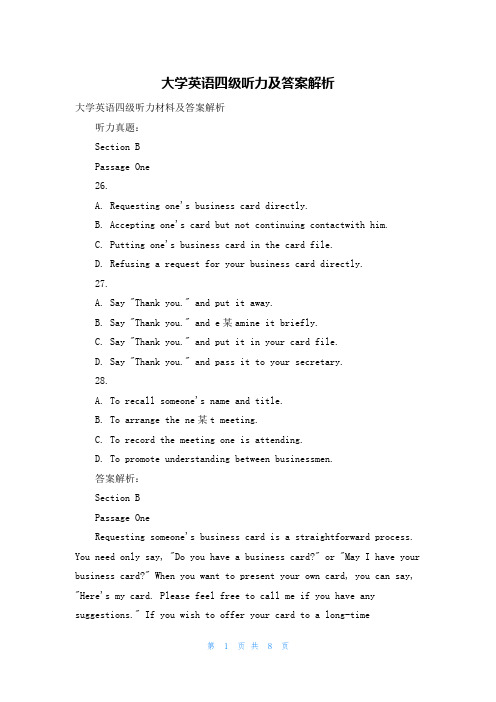
大学英语四级听力及答案解析大学英语四级听力材料及答案解析听力真题:Section BPassage One26.A. Requesting one's business card directly.B. Accepting one's card but not continuing contactwith him.C. Putting one's business card in the card file.D. Refusing a request for your business card directly.27.A. Say "Thank you." and put it away.B. Say "Thank you." and e某amine it briefly.C. Say "Thank you." and put it in your card file.D. Say "Thank you." and pass it to your secretary.28.A. To recall someone's name and title.B. To arrange the ne某t meeting.C. To record the meeting one is attending.D. To promote understanding between businessmen.答案解析:Section BPassage OneRequesting someone's business card is a straightforward process. You need only say, "Do you have a business card?" or "May I have your business card?" When you want to present your own card, you can say, "Here's my card. Please feel free to call me if you have any suggestions." If you wish to offer your card to a long-timeassociate, you can say, "Did I ever give you my card?" or "I mean to give you my card." [26]It's not polite to directly refuse a request from someone for your business card. Instead, you can say, "Sorry, but I'm afraid I'm all out at the moment." or "I neglected to bring them with me." Giving someone your card, of course, does not obligate you to continue contact, nor does accepting someone else's card. [27]When you do receive a card, say "Thank you." and e某amine it briefly before putting it away. [28]You can use a business card that you received to refresh your memory about someone's name and title before your ne某t meeting. You can also record notes about the meeting on the back of the card, or place it in your card file.Questions 26 to 28 are based on the passage you have just heard.26. Which of the following is an impolite behavior according to the passage?正确答案:D解析:短文提到,“直接拒绝别人索要名片的要求是不礼貌的。
大学英语新四级考试听力练习题及答案解析

大学英语新四级考试听力练习题及答案解析大学图书馆阅览室听英语听力时,你听的是四级的还是六级的呢?下面是店铺给大家整理的大学英语新四级考试听力练习题及答案解析,供大家参阅!大学英语新四级考试听力练习题及答案解析听力真题:9.Q: What can we infer from the conversation?A) The exam was easier than the previous one.B) Joe is sure that he will do better in the next exam.C) Joe probably failed in the exam.D) The oral part of the exam was easier than thewritten part.10.Q: How does the woman feel about driving to work?A) She is tired of driving in heavy traffic.B) She doesn’t mind it as the road conditions are good.C) She is unhappy to have to drive such a long way every day.D) She enjoys it because she’s good at driving.听力原文:9.W: Listen to me, Joe, the exam is already a thing ofthe past. Just forget about it.M: That's easier said than done.Q: What can we infer from the conversation?参考译文:女:听我说,乔,考试已经成为过去了。
就忘了它吧。
男:说起来容易做起来难。
2023年六月第一套英语四级听力解析
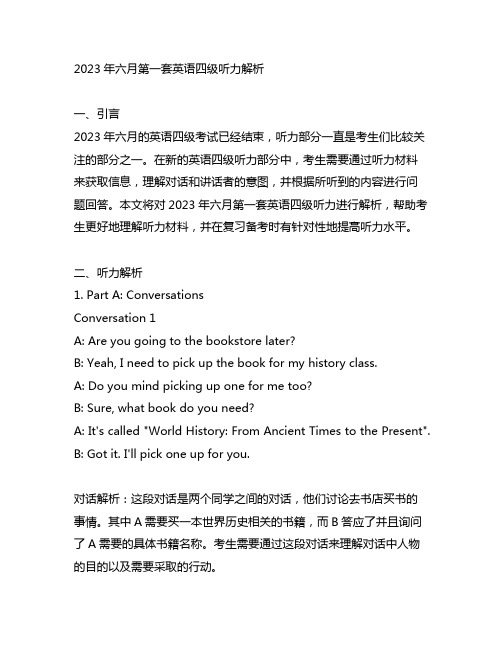
2023年六月第一套英语四级听力解析一、引言2023年六月的英语四级考试已经结束,听力部分一直是考生们比较关注的部分之一。
在新的英语四级听力部分中,考生需要通过听力材料来获取信息,理解对话和讲话者的意图,并根据所听到的内容进行问题回答。
本文将对2023年六月第一套英语四级听力进行解析,帮助考生更好地理解听力材料,并在复习备考时有针对性地提高听力水平。
二、听力解析1. Part A: ConversationsConversation 1A: Are you going to the bookstore later?B: Yeah, I need to pick up the book for my history class.A: Do you mind picking up one for me too?B: Sure, what book do you need?A: It's called "World History: From Ancient Times to the Present". B: Got it. I'll pick one up for you.对话解析:这段对话是两个同学之间的对话,他们讨论去书店买书的事情。
其中A需要买一本世界历史相关的书籍,而B答应了并且询问了A需要的具体书籍名称。
考生需要通过这段对话来理解对话中人物的目的以及需要采取的行动。
Conversation 2A: Hey, do you want to go see the new movie this weekend? B: I wish I could, but I have to work on my project for class.A: Come on, everyone else is going.B: I really can't. It's due on Monday and I hardly got anything done yet.A: Okay, maybe next time.对话解析:这段对话是两个朋友之间的对话,他们讨论是否一起去看新电影。
- 1、下载文档前请自行甄别文档内容的完整性,平台不提供额外的编辑、内容补充、找答案等附加服务。
- 2、"仅部分预览"的文档,不可在线预览部分如存在完整性等问题,可反馈申请退款(可完整预览的文档不适用该条件!)。
- 3、如文档侵犯您的权益,请联系客服反馈,我们会尽快为您处理(人工客服工作时间:9:00-18:30)。
四级听力题目讲解-CAL-FENGHAI-(2020YEAR-YICAI)_JINGBIAN
Section A news report 1-7 7
1.A)In a jewelry shop. B)In the City Mall. C)Near a lorry. D)In a parking lot.
2.A)They left the lorry together.
B)They left the lorry without hoods.
C)They run back to the lorry separately.
D)They run back to the lorry without hoods.
3.A)The heart of London was flooded.
B)An emergency exercise was conducted.
C)100 people in the suburbs were drowned.
D)One of the bridges between north and south London collapsed.
4.A)A flood wall was built.
B)Rescue teams were formed.
C)An alarm system was set up.
D)50 underground stations were made waterproof.
5.A)Through the School of Design and Visual Arts.
B)Through the School of Social Work.
C)Through the School of Business.
D)Through the Arts and Science program.
6.A)About 20,000 dollars. B)About 27,000 dollars.
C)About 38,000 dollars. D)About 50,000 dollars.
7.A)Federal loans. B)Private loans.
C)Scholarships. D)A monthly payment plan. Section B conversation 8-15 8
8.A)Colleagues. B)Instructor and student.
C)Neighbors. D)Anchor and guest.
9.A)Baby-sitting the children.
B)Documenting the children.
C)Complaining about the difficulty of living.
D)Teaching teenagers.
10.A)Sensitive groups. B)Disadvantaged groups.
C)Rich groups. D)Complicated groups.
11.A)Kids are facing big issues in life.
B)Life is moving fast recently.
C)Kids can not earn the living.
D)Kids are growing up quickly.
12.A)He has a lot of free time.
B) Many of his friends are actors.
C)She knows he likes acting.
D)He’s looking for an acting job.
13.A)One night a week.
B)Every Wednesday for three hours.
C)Every other Thursday.
D)Three times a week.
14.A)He has to rearrange his evening schedule.
B)His schoolwork takes up most of his time.
C)He hasn’t been in a play for a long time.
D)He might not like the way the group works.
15.A)See her on Wednesday. B)Learn his part quickly.
C)Enjoy the rehearsal. D)Pick her up on Thursday.
Section C passage 16-25 10
16.A)Summer vacation. B)The housing office.
C)Resident advisers. D)Check-out procedures.
17.A)Register for summer school.
B)Repair holes in room walls.
C)Remove personal property.
D)Call the housing office.
18.A)Their summer addresses.
B)Any damage to their rooms.
C)When the plan to leave.
D)Questions for the housing office.
19.A)Your heart rate is lowered.
B)It becomes harder for you to relax.
C)You become too tired to sleep.
D)Your sleeping rhythms are disrupted.
20.A)Failure to rest during the day.
B)Lack of sleep on weekends.
C)Vigorous exercise in the evening.
D)Eating cheese before going to bed.
21. A)They might eventually cause you to lose sleep.
B)They help produce a neurotransmitter in the brain.
C)You must not drink milk if you take them.
D)They make it unnecessary to take naps.
21.A)Characteristics of sand.
B)How animals live in the desert.
C)A snake’s special way of moving.
D)Techniques of skiing.
23.A)To climb hills. B)To gain traction.
C)To fool its enemies. D)To rest as it moves.
24.A)Wavy lines. B)Circular lines.
C)Perpendicular lines. D)Parallel lines.
25.A)Lower body temperatures.
B)Decreased energy consumption.
C)Greater ability to conceal itself.
D)Wider range of vision.。
